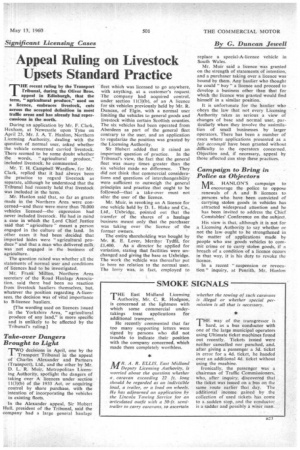Appeal Ruling on Livestock Upsets Standard Practice
Page 57

If you've noticed an error in this article please click here to report it so we can fix it.
THE recent ruling by the Transport Tribunal, during the Oliver Bros. appeal in Edinburgh, that the term, "agricultural produce," used on a licence, embraces livestock, cuts across the accepted definition in most traffic areas and has already had repercussions in the north.
During an application by Mr. F. Clark, Hexham, at Newcastle upon Tyne on April 25, Mr. J. A. T. Hanlon, Northern Licensing Authority, dealing with the question of normal user, asked whether the vehicle concerned carried 'livestock. There seemed to be some doubt whether the words, "agricultural produce," included livestock, he commented.
Mr. T. H. Campbell Wardlaw, for Mr. Clark, replied that it had always been the practice to regard livestock as separate, although he understood that the Tribunal had recently held that livestock was included in the term.
Mr. Hanlon said that, so far as grants made in the Northern Area were concerned—and there were more than 70,000 vehicles licensed—the expression had never included livestock. He had in mind a case in which the Lord Chief Justice said that " agriculture " meant a person engaged in the culture of the land. In other cases it had been decided that imported hides were "agricultural produce" and that a man who delivered milk was not engaged in the business of agriculture.
The question raised was whether all the statements of normal user and conditions of licences had to be investigated.
Mr. Frank Milton, Northetn Area secretary of the Road Haulage Association, said there had been no reaction from livestock hauliers themselves, but, whatever the position regarding A-licensees, the decision was of vital importance to B-licence hauliers.
[The wording used on licences issued in the Yorkshire Area, "agricultural produce of any land," is more specific and is unlikely to be affected by the Tribunal's ruling.] 'fleet which was licensed to go anywhere, with anything, at a customer's request. The company had acquired control, under section 11(3)(b), of an A licence for six vehicles previously held by Mr. R. Duncan, of Elgin, with a normal user limiting the vehicles to general goods and livestock within certain Scottish counties. The six vehicles had been operated from Aberdeen as part of the general fleet contrary to the user, and an application to regularize the position was granted by the Licensing Authority.
Sir Hubert added that it raised an important question of practice. In the Tribunal's view, the fact that the general fleet was many times greater than the six vehicles made no difference. They did not think that commercial considerations and questions of interchangeability were sufficient to outweigh the general principles and practice that ought to be followed—that a take-over must not alter the user of the licence.
Mr. Muir, in revoking an A licence for one vehicle held by D. L. Blake and Co., Ltd., Uxbridge. pointed out that the transfer of the shares of a haulage business meant only that the purchaser was taking over the licence of the former owners.
The entire shareholding was bought by Mr. R. E. Lever, Merthyr Tydfil, for £1,400. As a director he applied for variation, stating that facilities were unchanged and giving the base as Uxbridge. The work the vehicle was thereafter put to bore no relation to the normal user. The lorry was, in fact, employed to replace a special-A-licence vehicle in South Wales.
Mr. Muir said a licence was granted on the strength of statements of intention, and a purchaser taking over a licence was bound by them. Any haulier who thought he could " buy " a licence and proceed to develop a business other than that for which the licence was granted would find himself in a similar position.
It is unfortunate for the haulier who obeys the law that not every Licensing Authority takes as serious a view of changes of base and normal user, particularly when they involve the assimilation of small businesses by larger operators. There has been a number of cases where applications presented as a fait accompli have been granted without difficulty to the operators concerned. Objection and, if necessary, appeal by those affected can stop these practices.




































































































